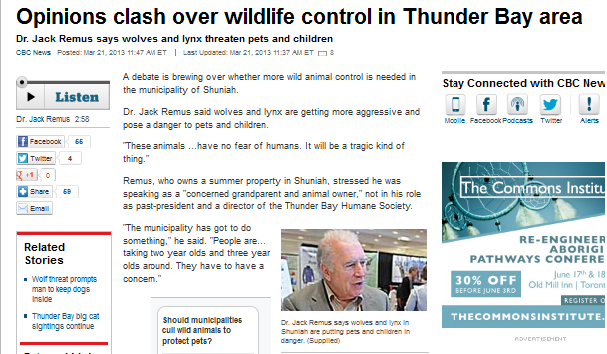 Canada is one of the largest countries in the world in terms of land area, but also has a relatively small population. As such, many Canadians are mindful and appreciative of the wilderness around them, especially the feral animals whose worlds often collide with their own. Although many Canadians are in favor of humane animal control, many agree that the protection of the human population must always be of paramount concern.
Canada is one of the largest countries in the world in terms of land area, but also has a relatively small population. As such, many Canadians are mindful and appreciative of the wilderness around them, especially the feral animals whose worlds often collide with their own. Although many Canadians are in favor of humane animal control, many agree that the protection of the human population must always be of paramount concern.
This is the gist of the CBC News article about such a controversy brewing among some residents in the municipality of Shuniah in the Thunder Bay region of Ontario. Another relatively populous area, the city of Mississauga (which is a suburb of Toronto), has its share of ethical wildlife woes.
The debate is between Dr. Jack Remus, who owns a summer property in Shuniah, and Maria Harding, the reeve or president of the town council. Dr. Remus wants more wild animal control services to contain species like wolves and lynx, which he says have become more aggressive and dangerous to humans (particularly young children) and pets. On the other hand, Ms. Harding argues that wolves and lynx are part of living in the wild, and trapping these wild animals is not the answer to the problem.
Ms. Harding believes that the answer lies in pet owners taking more responsibility for their pets by not letting them go out alone. However, Dr. Remus does not accept such views; and insists that a real danger exists, which the town council must address to protect the human population. The debate is not only relevant in Shuniah and the Thunder Bay area, since animal control in Mississauga and other areas of Ontario is shaken by controversy .
Although wildlife in more urbanized parts of Ontario is generally not as dangerous as wolf or lynx, it has its share of inconveniences. Animals like rodents and birds might intrusively nest in different parts of the house, like the attic, roof, and walls. These creatures can cause a lot of damage and leave a mess, which might not only compromise your home insulation, but could leave members of your household sick.
Fortunately, you can rely on animal control specialists to rid your property of these pests without getting into a fiery debate with animal welfare organizations. These animal control specialists can re-insulate your home from incursions using a process that involves assessment, removal, clearing-up, cleaning, and the application of cellulose insulation. Cellulose insulation is made from 85 percent recycled organic cellulose fibers, making it environmentally-friendly.
Cellulose fibers will not just improve your home’s insulation and reduce your energy bills, but will also keep your homes safe as it is infused with fire retardants and pest repellants. Humane animal control causes no harm to man or beast, and provides full protection of your property and its residents. If you’re looking for the right balance between humane animal control and the protection of populated areas, you can call on these experts to handle the situation.


